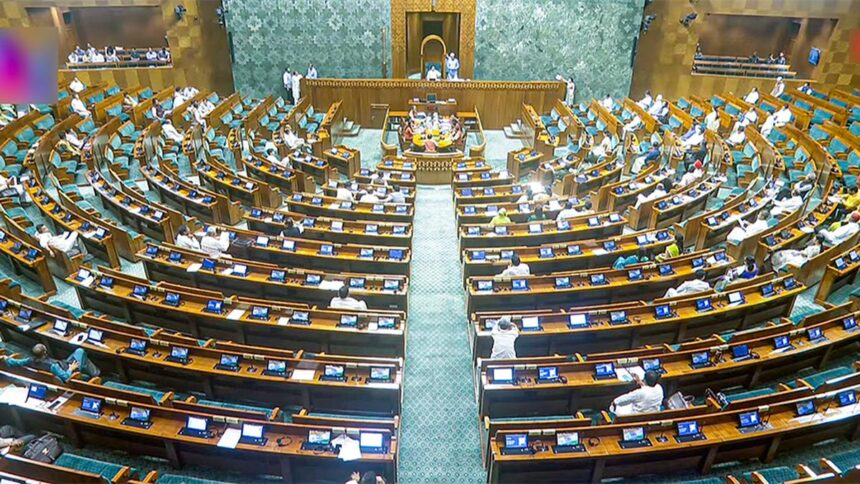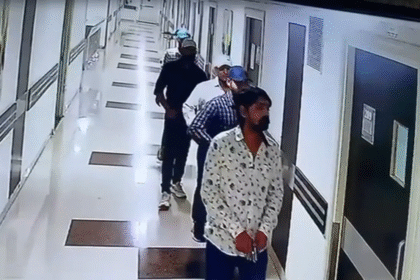Parliament Monsoon Session Day 11: Lok Sabha and Rajya Sabha Resume Heated Debates on August 4, 2025
The eleventh day of the Monsoon Session 2025 of the Indian Parliament convened on August 4, marking a pivotal moment in the ongoing political discourse within the Lok Sabha and Rajya Sabha. The atmosphere inside the House was a microcosm of the broader national climate—tense, expectant, and animated. As both houses assembled, the nation watched with anticipation, awaiting clarity on multiple legislative matters and political standoffs.
India’s bicameral legislature, comprising the Lok Sabha (House of the People) and the Rajya Sabha (Council of States), has seen intense debate during this session on topics ranging from economic policy, national security, and agricultural reforms, to issues of freedom of speech, civil rights, and state autonomy. With only a few days left in the session, political parties across the spectrum were seen pressing their positions strongly, attempting to push bills, stall adversarial proposals, or demand explanations from the central government.
Setting the Stage: Political Background and Key Themes
The 2025 Monsoon Session has not been a smooth sail. In the ten days preceding August 4, proceedings were often marred by adjournments, walkouts, and heated exchanges. Central to these disruptions have been issues such as the controversial State Surveillance Reform Bill, the proposed amendments to the National Education Policy, and the implementation challenges of the Digital India Infrastructure Expansion Scheme.
Moreover, recent comments made by political leaders—some of them triggering widespread public outcry—have also shaped the Parliament’s atmosphere. The fallout from high-profile events such as inter-state water disputes, military deployment decisions, and civic unrest in metropolitan cities have only amplified the tension in the House.
Lok Sabha: Government vs Opposition Narrative
At 11:00 a.m., the Speaker of the Lok Sabha called the House to order. The Treasury benches, led by the Union Home Minister, opened the day’s session with a formal presentation of the Internal Security Review Report 2024–25. This report highlighted steps taken to counter insurgency, bolster cross-border intelligence, and combat cyber threats. The Home Minister emphasized the progress in high-altitude border zones and cooperative measures with neighboring states to enhance internal stability.
However, the Opposition benches, spearheaded by the Leader of the Opposition, were quick to question the efficacy and transparency of the report’s claims. The Congress, Trinamool Congress (TMC), AAP, and DMK united briefly in demanding a parliamentary probe into the misuse of surveillance technologies in states governed by non-BJP alliances. They also criticized the lack of accountability in major defense procurements and the centralization of administrative decisions regarding disaster relief allocations.
Multiple adjournments followed during the zero hour. The Speaker had to intervene several times, cautioning members on both sides about decorum, even as shouts of “Dictatorship in disguise!” and “State rights under attack!” echoed across the chamber.
Rajya Sabha: Legislative Focus and Intellectual Debate
The Rajya Sabha, in contrast to the Lok Sabha, maintained a relatively structured rhythm. The day’s primary agenda involved debate and voting on the Agricultural Land Leasing Regulation Bill—a proposal aimed at formalizing tenant farming, safeguarding farmers’ rights, and attracting investment into rural economies.
Senior parliamentarians from various states, including Tamil Nadu, Maharashtra, Punjab, and Odisha, contributed nuanced perspectives to the debate. A standout moment came when a Rajya Sabha member from Kerala quoted from Dr. B.R. Ambedkar’s writings on land reform, arguing for a balance between economic liberalization and grassroots equity.
However, not everything remained calm. Tensions spiked during the discussion of the Broadcast Code Amendment Bill, which seeks to regulate online news content under the Press Council. Opposition leaders argued that such regulation, without independent oversight, would stifle journalistic freedom. Members from the Left parties and the Independent bloc raised concerns over surveillance and the risk of creating a “State-sponsored media narrative.”
Media and Public Reaction Outside Parliament
Even as debates raged inside the Parliament, the mood outside was one of engagement and activism. Students’ groups, civil society organizations, and farmer unions organized peaceful demonstrations at Jantar Mantar, demanding fair hearings on bills that affected their constituencies. Social media platforms like X (formerly Twitter), YouTube, and Threads were flooded with live reactions, breakdowns of proceedings, and fact-checking by independent journalists.
As the eleventh day drew to a close, Parliament remained a battleground of competing ideologies and unresolved tensions. What made the day historic was not merely the content of the debate, but the intensity and volume of democratic engagement that surrounded it. With several bills pending and the nation’s gaze fixed firmly on the Houses, Day 12 promises more action, more stakes, and potentially, more consequences.
As the second half of Day 11 of the 2025 Parliament Monsoon Session unfolded, the primary focus inside both Lok Sabha and Rajya Sabha shifted toward in-depth discussions on a set of bills that could significantly influence India’s political and social trajectory. The gravity of these proposals reflected not only in the length of debates but also in the legal, ethical, and regional dimensions attached to each one.
In this part, we explore the bills tabled, the arguments for and against them, the stakeholders involved, and how these developments may impact governance and public life going forward.
The State Surveillance Reform Bill, 2025
Perhaps the most debated legislative agenda on Day 11 was the introduction of the State Surveillance Reform Bill in the Lok Sabha by the Ministry of Home Affairs. The bill proposes sweeping changes to how government agencies gather, store, and process surveillance data from citizens, citing the need for modernization and cybersecurity challenges.
Key Features of the Bill:
- Centralized digital repository for surveillance data.
- Legal framework for the use of AI-driven surveillance in urban policing.
- Mandatory state nodal authority for cross-border data exchange.
- A three-tiered grievance redressal mechanism.
Opposition’s Concerns:
Opposition parties, particularly the Congress, Trinamool Congress, Left Front, and Samajwadi Party, slammed the bill as “legislative overreach.” They alleged it would:
- Violate citizens’ right to privacy as guaranteed by the Supreme Court verdict in Justice K.S. Puttaswamy vs Union of India.
- Enable blanket surveillance without adequate judicial oversight.
- Risk misuse during election periods to target political opponents or civil society groups.
Several MPs referenced recent incidents in Karnataka and Manipur, where unauthorized tapping and metadata collection were allegedly carried out, demanding a full inquiry before any such law is passed.
Government’s Defense:
The Home Minister defended the bill, arguing that global challenges like terror financing, radicalization via encrypted apps, and transnational cyber fraud necessitate a robust legal architecture. “India cannot afford to fall behind in building a surveillance ecosystem that matches global standards,” he stated.
The Lok Sabha was adjourned amid protests and counter-protests, to resume discussion post-lunch.
The Broadcast Code Amendment Bill, 2025
The Rajya Sabha saw a fiery debate around the Broadcast Code Amendment Bill, aimed at bringing digital-first and streaming platforms under the ambit of the Press Council of India and regulating “deliberately misleading” content.
What the Bill Proposes:
- Introduction of “fact-verification compliance” units for news organizations.
- Mandatory 24-hour takedown clause for flagged content deemed “harmful to national security or public order.”
- Graded fines up to ₹5 crore for repeat violators.
- An appellate tribunal for digital content disputes.
Concerns Voiced in the Upper House:
- Journalists’ associations and digital media houses fear the bill could lead to pre-censorship.
- Regional parties like the DMK, Shiv Sena (UBT), and AAP questioned whether such central control over content erodes federal rights.
- Critics also pointed out that this bill could duplicate or clash with the powers of the Information Technology Act and the Data Protection Law.
An AAP Rajya Sabha MP from Delhi likened the bill to “placing a leash on the dog of democracy.” In response, government ministers maintained that the bill would not infringe on press freedom but would curb fake news ecosystems that have caused violence and panic in the past.
The Agricultural Land Leasing Regulation Bill, 2025
The Agricultural Land Leasing Regulation Bill was a relatively bipartisan issue but still ignited significant debate, especially from members representing agrarian states like Punjab, Uttar Pradesh, and Bihar.
Bill Highlights:
- Legal framework to formalize land lease agreements between landowners and tenant farmers.
- Protection from eviction for contract-compliant tenant farmers.
- Inclusion of tenant farmers in crop insurance and government subsidies.
Supporters’ Views:
- Encourages investments in rural land infrastructure and irrigation.
- Offers financial security and bank credit eligibility for tenant farmers.
- Reduces informal exploitation by landowners.
Points of Contention:
- Skeptics warned of a “corporatization route” to land rights.
- Several MPs demanded clarity on ownership titles, especially in tribal and backward regions.
- Concerns were raised about land grabbing in border and forest-adjacent zones.
The Rajya Sabha referred the bill to the Standing Committee on Agriculture and Farmers’ Welfare for deeper evaluation and state consultations.
Short Discussions and Private Member’s Bills
Beyond the headline bills, several members participated in short-duration discussions, including:
- Private Member’s Bill for Uniform Civil Code introduced by a BJP MP from Gujarat.
- Call for a national policy on urban flooding by a Congress MP from Tamil Nadu.
- Proposal for Digital Health Ethics Regulation, introduced by a BJD MP from Odisha, emphasizing ethical AI in health diagnostics.
While most private members’ bills do not get enacted, they offer a glimpse into the policy thinking of individual MPs and set the tone for public discourse.
Behind-the-Scenes Maneuvering: The Realpolitik
Day 11 was not just about floor debates. Political insiders reported back-channel negotiations among the NDA allies, especially over how to balance progressive surveillance legislation with civil liberty optics ahead of key state elections in Bihar and Maharashtra.
Meanwhile, the Opposition parties hinted at a joint protest march if the surveillance and broadcast bills are pushed through without committee scrutiny. A closed-door meeting was reportedly held at the residence of the Leader of Opposition in Rajya Sabha, indicating a strategy to stall proceedings on Day 12 if necessary.
The eleventh day of the 2025 Monsoon Session revealed the fault lines and frameworks of Indian democracy—where each bill, each word, and each procedural motion becomes a battlefield for constitutional interpretation, electoral calculus, and national direction. As the day drew to a close, the Houses remained ideologically divided but undeniably active.
While the Lok Sabha and Rajya Sabha were the epicenters of formal political discourse on Day 11 of the 2025 Monsoon Session, the real tremors were felt outside Parliament. As the controversial bills were tabled and debated, an intense wave of public reaction, legal scrutiny, expert commentary, and civil society mobilization unfolded in parallel across India.
This part examines how legal communities, civil society groups, state governments, industry associations, and ordinary citizens responded to the legislative proposals—especially the State Surveillance Reform Bill and the Broadcast Code Amendment Bill.
Legal Experts: A Constitutional Tug-of-War
Prominent constitutional lawyers and former judges responded swiftly to the State Surveillance Reform Bill, expressing deep concern about its potential clash with fundamental rights.
Key Concerns Raised by Legal Experts:
- Lack of judicial safeguards: Multiple former Supreme Court judges, including Justice (Retd.) Madan Lokur and Justice (Retd.) Deepak Gupta, emphasized that the bill doesn’t include prior judicial review before initiating surveillance—a direct contradiction to the principles laid down in Puttaswamy v. Union of India.
- Overbroad definitions: The bill’s use of terms like “national interest,” “public tranquility,” and “suspicious data patterns” were described as vague and vulnerable to misuse.
- Federal overreach: Legal scholars argued that the Centre was attempting to legislate in areas that fall under State List subjects, especially policing and public order.
The Supreme Court Bar Association (SCBA) issued a press release urging the Parliament to refer the bill to a Joint Parliamentary Committee (JPC). The statement read: “In its current form, the bill risks subverting constitutional safeguards that protect the citizen from the state—not just criminals from investigation.”
Civil Society Groups: ‘Surveillance State’ and Fear of Censorship
Across Delhi, Mumbai, Bengaluru, Hyderabad, and Kolkata, civil society organizations convened emergency panels, town halls, and digital campaigns to push back against what they called “backdoor authoritarianism.”
Statements and Protests:
- Internet Freedom Foundation (IFF) launched the #RightToPrivacyMatters campaign, warning that “India is hurtling toward an Orwellian state with neither consent nor judicial control.”
- People’s Union for Civil Liberties (PUCL) called the surveillance bill “a mass violation of personal liberties masquerading as cybersecurity.”
- Digital News Foundation (DNF) and multiple journalists’ unions condemned the Broadcast Code Amendment Bill, terming it “a blanket muzzle” on media.
Online petitions rapidly gathered momentum:
- Over 2.3 lakh signatures were collected on Change.org demanding a rollback of the Surveillance Bill.
- A global coalition of media watchdogs, including Reporters Without Borders, raised alarm over the Broadcast Bill, saying it might push India further down on the World Press Freedom Index.
State-Level Political Responses: A Question of Federalism
Several non-BJP-ruled states mounted stiff resistance, warning of a breakdown in Centre-State coordination if the bills proceed without amendments.
Tamil Nadu, Kerala, and West Bengal:
- Their chief ministers issued joint statements condemning the surveillance bill as a “unitary overreach into law and order, a State subject.”
- Kerala’s Chief Minister Pinarayi Vijayan called the bills “a second coming of the Emergency, this time with a digital face.”
- Tamil Nadu warned it would consider filing a petition in the Supreme Court if the bills were enacted without accommodating state-level objections.
Maharashtra and Telangana:
- While Maharashtra (under coalition rule) issued a cautious advisory requesting data access boundaries, Telangana categorically rejected the Center’s proposal to unify all surveillance data into a national cloud platform.
Meanwhile, Bihar, Uttar Pradesh, and Assam — BJP-led states — welcomed the Surveillance Reform Bill, stating it would help track “illegal immigrants, extremist groups, and fraud networks” in border districts and high-crime areas.
Media Reactions and Editorial Opinions
India’s leading newspapers and digital platforms published explainer editorials, opinion columns, and long-read investigations into the implications of these bills.
Editorial Lines:
- The Hindu called the Broadcast Bill “a step too close to soft-censorship.”
- The Indian Express editorial emphasized that “while fake news is a threat, the solution cannot be a bureaucratic gatekeeper to editorial independence.”
- Hindustan Times took a middle-ground approach, suggesting the need for “stronger checks, but with stronger accountability for the State.”
Television panels hosted high-profile debates, featuring former ministers, cybersecurity experts, activists, and retired judges. Trending topics on Indian Twitter (now “X”) included:
#DigitalEmergency#SurveillanceBill2025#IndiaCensorsFreeSpeech#PrivacyInPeril
Industry Reactions: IT, OTT, and Media Platforms Speak Out
The tech industry and digital media companies were divided in their response.
OTT Platforms and News Startups:
- Representatives from platforms like Scroll, The Wire, Newslaundry, and Alt News issued a joint statement condemning the Broadcast Bill as a “clear attempt to algorithmically silence independent journalism.”
- A group of streaming platforms, including Netflix India and Amazon Prime Video, expressed worry that the new takedown and penalty provisions could make India “an unpredictable market for creative professionals.”
Tech and Data Industry Voices:
- NASSCOM urged the government to maintain a “technology-neutral” and “innovation-friendly” approach.
- Startups in the AI and cybersecurity space demanded clarity on data access protocols under the surveillance bill, especially regarding compliance timelines and audit mechanisms.
Common Citizens: A Mixed Bag of Emotions
On the ground, reactions from ordinary citizens revealed a spectrum of perspectives.
Urban Professionals: Many working in IT, finance, or law expressed discomfort about mass surveillance. “I have nothing to hide, but that doesn’t mean I want to be watched 24/7,” said a Bengaluru-based data analyst.
Rural Citizens: In tier-2 and tier-3 towns, awareness was low. However, concerns around land leasing, as debated earlier in Parliament, were growing, especially among tenant farmers who feared losing ancestral rights.
Youth Voices: Student protests were held in JNU, Jamia Millia Islamia, and TISS. Slogans like “Data is democracy” and “No spying in my name” rang across campuses.
Day 11 of Parliament was more than just another legislative milestone—it became a national moment of reckoning. As institutions, experts, states, and people voiced their hopes and fears, the implications of these bills became broader than law—they became about the soul of Indian democracy, its relationship with digital power, and the responsibilities of governance in the surveillance age.
Also Read : Supreme Court Hears Rahul Gandhi’s ‘True Indian’ Defamation Case, Questions Intent Behind Remarks
.








